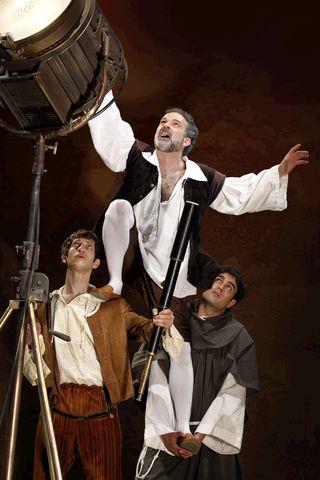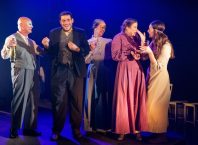“Everything is in motion” in The Beer Sheva Theatre production of Bertolt Brecht’s Galileo, translated and directed by Ido Riklin. The play evokes the sensibility and struggles of a distant era, yet the issues it engages resonate with relevance for contemporary audiences. Describing the latter part of Italian physicist and philosopher Galileo Galilei’s life and career, the play reveals the human aspect of the scientist, illuminates the concept of scientific inquiry, and examines ethics in a colorful production full of love, laughter, and song, performed by an excellent cast.
We don’t see a lot of science in the theatre. The outstanding exceptions – Tom Stoppard’s Arcadia, Michael Frayn’s Copenhagen, David Auburn’s Proof – underscore the infrequent appearance of science and scientists on the stage. One might be tempted to suggest that the work of science, in its measured pace of infinitesimally slow and meticulously documented mental meanderings does not provide enough action for the stage. Anyone who’s watched a young man make up his mind for the better part of two hours or a couple of other guys wait around for some other guy who never shows up, know that cannot be the reason. Perhaps science, with its labs and logic, simply does not generate enough emotion drama to sustain a drama? Anyone who’s ever attempted to discuss evolution with a creationist knows that science can certainly stir up the emotions.
Highly intelligent yet annoyingly dull and possibly somewhat loony, purely rational and removed from human drama, easily manipulating complex mathematical equations yet unable to carry on a simple conversation with ‘ordinary’ people – the image of scientists in the arts and popular culture often consists of clichés that simultaneously elevate and diminish scientists and their work by setting them at a distance from the rest of human activity. Perhaps in investigating the presence of science in theatre and the arts, the question should be: who benefits from the proliferation of these clichés and stereotypes?
Galileo as portrayed by Amir Krief is earthy and sensual, enjoying a good meal, worrying about how he will pay for the next meal, full of humor, energy and curiosity. Galileo’s peripatetic vigor and childlike enthusiasm in the first scenes deepens into a complex portrait of a man who has endured suffering in pursuit of intellectual freedom. Theatre lights of all sizes adorn the stage in that first scene, as Galileo makes use of them to demonstrate the wonders of the Copernican universe for Andrea, the housekeeper’s son. Visually appealing, the lights are a wonderful prop and metaphor in this production that shines a light on the joys as well as the rigors and challenges of science.

Apparently, some things haven’t changed since the early 17th century, as Galileo is informed that “math is not a profitable department” and if he wants a raise, he will have to find a way to generate income. Academics in the audience will easily empathize with his response: “What is the use of freedom to research when I have no time for research?”
Each incident and chapter in Galileo’s life as it unfolds in the play opens up different directions of thought. On hearing of a new invention from the Netherlands, a tube with two lenses that magnifies distant objects, Galileo immediately thinks of a way to improve the lens, and how he might use it in his research, and incidentally, turn a profit. These first few scenes demonstrate the way in which our tools and thoughts are intimately connected. The improved lens enabled Galileo to literally view the world differently. Yet the tool alone did not change anyone’s world view – the invention described to Galileo was a curiosity, a gadget, a toy. It was Galileo’s ability to view the object and imagine its potential that transformed the tool, and the look of tender wonder on Galileo’s face as he looks through the telescope lets the viewer share the experience of his vision.
The relatively small cast plays a variety of roles, recreating the different times and places in Galileo’s life. Yonit Tubi is delightful as the young Cosimo de Medici, and her portrayal of Galileo’s daughter Virginia is touching as the fresh young girl becomes a wearily resigned and devout woman, faithfully tending her aging father. It is interesting to note that although Brecht’s text is for the most part consistent with Galileo’s biography, he diverges from the historical truth in regard to Virginia.
Historically, Galileo, who did not marry his children’s mother and struggled with financial problems throughout his life, placed his two daughters Virginia and Livia in a convent when they were 13 and 12, respectively. Galileo maintained a close correspondence with Virginia throughout her life (she died in 1634), referring to her in a letter to a friend as ““A woman of exquisite mind, singular goodness and most tenderly attached to me.”* Brecht chooses to create the character of Virginia as a rather stereotypical young girl who does not take an interest in her father’s research, and is not considered by him to be capable of intellectual pursuits or conversation. While the change allows the introduction of a love interest within the play, this strange deviation from history on the part of Brecht gives one pause, particularly in a play that is so concerned with truth.
At several junctures in the play, veiled reference is made to Giordano Bruno who was burned at the stake by the Inquisition. At one point Galileo says: “Will I have the strength to shout out the truth even when they burn me? That is the question.” It is a play full of questions, and very much about the act of questioning. This is the work of science: science asks questions, and every question, every answer along the way opens up more questions. It is not enough to have a telescope; one must also have the urge to look up at the sky. Having seen the craters on the moon and the spots on the sun, does one have the courage to communicate that knowledge and question further?
What forces are at work to prevent the communication of knowledge? What interests are served by keeping science at a distance from the consciousness of the majority of the population? In Galileo, it’s the collaboration of the ruling classes and priests, armed with money and the threat of the Inquisition. Yet time and again, listening to the words of the play, one feels that not that much has changed since the 17th century. Money and power united in a conspiracy to keep the masses ignorant – sounds all too contemporary. Towards the end of the play, Galileo speaks of people “stumbling in a fog of superstition” perpetuated by the priests, yet his unswerving gaze is turned inward as well: “But can we turn our backs on the people and still remain scientists?… Given time, you may well discover everything there is to discover, but your progress will be a progression away from humanity. The gulf between you and humanity may one day be so wide that the response to your exultation about some new achievement will be a universal outcry of horror.”**
Riklin’s production of Brecht’s Galileo illuminates Galileo’s life and character, bringing his world closer to us. Opening a welcome dialogue between the arts and science, it is a call to question, a call to action.
A performance of Galileo will take place in Tel Aviv on Tuesday, February 28, 2012 at 20:30, ZOA House, Daniel Frish Street.
Galileo by Bertolt Brecht, translated and directed by Ido Ricklin
Set Design: Tali Ottolenghi
Costume Design: Neta Haker
Lighting Design: Adi Shimrony
Music: Dori Parnes
Vocals: Doki Atzmon
Choreography: Guy Alon
Cast: Amir Krief – Galileo Gallilei; Guy Alon – Signor Priuli, Court Lady, Cardinal Barberini (later Pope), Galillei’s Former Student, Boy; Adva Edni – Signora Sarti, A Very Old Monk, The Ballad Singer’s Wife, Girl; Tom Hagi – Andrea Sarti, An Anxious Monk; Rodie Koslovsky – Venetian Senator, Mathematician, The Cardinal Inquisitor, Manservant, Peasant, Border Guard; Yirmi Reich – Ludovico Marsili, Theologist, An Infurianted Monk, The Stranger, Boy (Guiseppe); Yonit Tobi – Virginia Gallilei, Cosimo de Medici (as a boy); Yossi Zabari – Sagredo, Philosopher, An Elderly Monk, Cardinal Bellarmin, Signor Gaffone, The Ballad Singer, Clerk at the Border; Monks, Singers and Dancers played by the company.
* Galileo’s Daughter by Dava Sobel (Walker & Company, New York 1999), p. 10.
** English translation by Wolfgang Sauerlander and Ralph Manheirn, 2007.






Comments are closed.